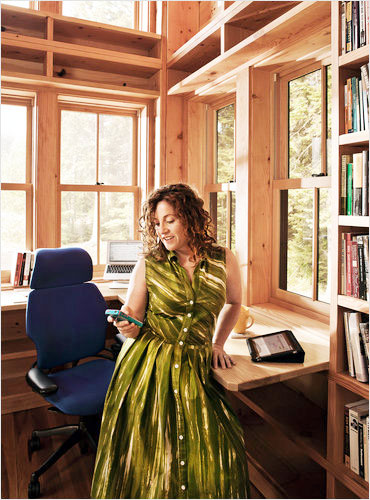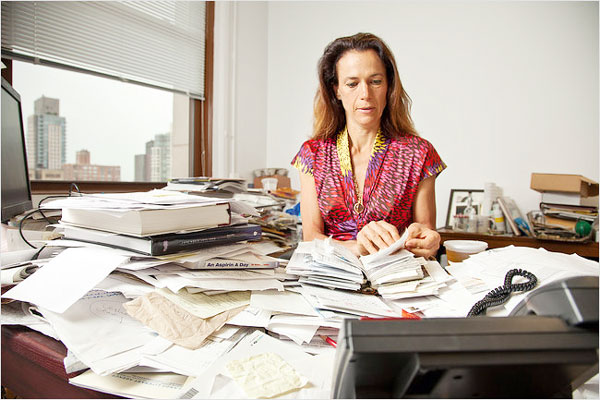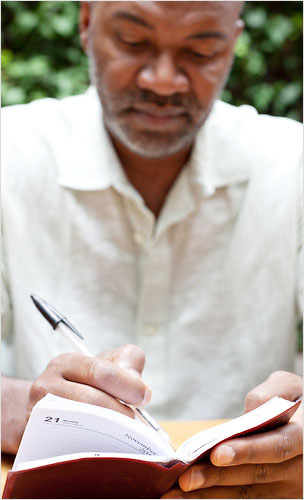A paper calendar? It's 2011
 |
|
[Photo/The New York Times] |
 |
|
[Photo/The New York Times] |
 |
|
[Photo/The New York Times] |
For many would-be diarists, the annual inserts serve as a substitute journal, often filed on a bookshelf like a set of 19th-century memoirs. A similar diary stored in the recesses of a computer hard drive or afloat somewhere on the cloud feels decidedly less real.
Lorin Stein, editor of the Paris Review, is on his 10th New Yorker desk calendar. "I can look up exactly what I did in the last 10 years," he said with pride. At night, Mr. Stein leaves his calendar at work ("back in the world of obligation," he said).
The yawning gap between work and home can be welcome. Even electronic aficionados concede that the lines blur on a networked system. When Christena Nippert-Eng, a sociologist at the Illinois Institute of Technology, conducted a study of how people balanced their lives, two objects had significance: keys and a calendar. "People who merged their home and work keep all their keys on one chain and all their home and work commitments on one calendar."
The study led Ms. Nippert-Eng to examine how calendar use affects privacy. "Electronically managing everything — friends, communications, information — is a good way to break down the boundaries between the different parts of your life," she said. "Some people are O.K. with blurred boundaries. They'll 'friend' anyone. But it makes it harder to keep aspects of your life separate."
Part of what raises the paper team's hackles about electronic systems is that others may become privy to an afternoon's haircut or a therapy appointment. But electronic calendar users often thrive on the convenience that comes from synchronicity. Gina Neff, an assistant professor of communication at the University of Washington, shares an electronic calendar with her husband. "He's always inviting me to meetings that I don't need to be at but need to know about in order to schedule myself around them," she said. "It's totally distracting, but it works."
Some might say it's T.M.I. Ms. Neff's husband even "invites" her, in the terminology of electronic calendaring, to his guys' night out. "I know when he's playing Xbox with one of his oldest friends and so have the night free."
Of course, not all couples are on the same system. "That's all my wife and I do: argue about her paper calendar and my electronic one," David Shenk, a Brooklyn-based author, said partly in jest. Mr. Shenk is in the process of converting his wife, at least in part, to his system. "But if she doesn't input information in the right account or the Internet is down, it may not sync," he said. "I get mad at her for not doing it right, but of course it's not her fault: it's a very complicated process."
The divide between paper- and digital-calendar people is in some cases unbreachable. Mr. Doonan's husband, he said, calls him "a geriatric lunatic with relentless regularity."
But things get lost even between couples synced on the cloud. When a husband pastes an invitation to the Smiths' barbecue into his wife's calendar, it is no longer accompanied by a sigh and the "We didn't go last year, but I think we really need to go this year because they got us such a lovely baby gift and we haven't reciprocated, but if we go I promise we'll leave by 8 and we can just ignore the Joneses who will inevitably be there."
Ms. Neff, who studies how technology and communication affect people's lives, calls this "messy talk." Sometimes, she said, "digital technologies can short-circuit necessary discussions."
The slow creep of clean and efficient technology and the managed life into the domestic sphere has multiple consequences. "We're not compelled to go to a social event just because someone set it up for X o'clock in our calendar," Ms. Neff said. "Just because we've figured out these time strategies in the office, doesn't mean we should always adopt them in our social lives."
Then there are those who float between two systems or develop their own alternatives. Anna Holmes, the founding editor of Jezebel.com, uses a collage of paper and electronic stickies on her Mac desktop. "I just do not want to have to open another computer application," she said by way of explanation. Stickies don't need to be saved. There's never a spinning color wheel.
Makers of old-fashioned calendars are trying to keep up with the electronic march. Letts, a diary company based in Britain, sells personalized inserts for Filofaxes and other diaries that incorporate birthday and anniversaries so users don't have to laboriously write them in each year. In 2009, Day-Timer introduced calendar apps for the iPhone.
It may be an uphill battle. According to Matt Tatham, a spokesman for Experian Simmons, a unit of Experian Marketing Services, a market research firm, the use of electronic calendars is growing. "Among online Americans, 22 percent of online adults maintain a calendar on their cellphone or their tablet, and 34 percent of tablet owners maintain an electronic calendar on their tablet," Mr. Tatham said, citing his company's data. "I would imagine those numbers will go up as the adoption of smartphones and tablets continues to increase in the U.S."
Even committed paper calendar keepers, like Muffie Potter Aston, a socialite and philanthropist, concede there are drawbacks to their approach. "It would no doubt be wonderful to just be at a meeting and be able to agree to a date on the spot," said Ms. Aston, who keeps a desk calendar at home. But like other paper keepers, she's reluctant to cross over electronically, partly out of fear. "I've suffered too many computer meltdowns that have almost melted me down. Maybe if I had a little computer genie that handled the glitches, I could make the switch."
As for me, it would take cold hard cash to make me cross over. Of course, I said that about the cellphone and Facebook, too. Now, how to explain all this in 140 characters or less. ...
















